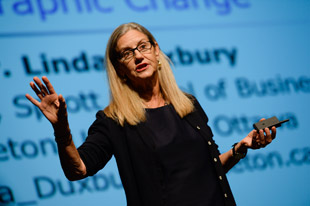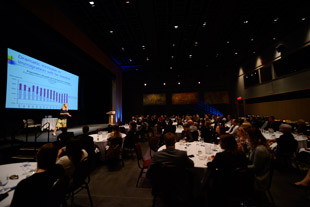Demographic change is coming. Are you ready?

Here’s a scary statistic: by 2016, Canada is going to face a skilled-labour shortage of about 300,000 people.
Even scarier? By 2031, that number could rise to 1.7 million.
Canada is staring at a demographic crisis that will affect government, business and individuals, according to Sprott School of Business professor Dr. Linda Duxbury.
“Without some change, it’s going to cost you,” she said. “It’s going to cost you a lot of money.”
At the first Sprott Topics Speaker Series event Sept. 20, Duxbury spoke about how this “tsunami of demographic change” started, what it means for the working world, and how organizations can adapt to survive.
“If anyone said this was going to be a fun talk, they lied to you,” she said.
The Situation in Canada
So why exactly is Canada facing a labour shortage? Duxbury said it’s a combination of several factors.
The birthrate necessary to maintain a stable population in Canada is 2.1 children per family. Currently, Canada sits at 1.5.
The last time Canada hit 2.1? 1969. Even more startling, during the peak years of the Baby Boom, Canada had a birthrate of 4.1.
Compounding the problem further are two trends: women delaying childbirth and people delaying entry into the workforce. The average age a woman has her first child in Canada is now 31, while the average age a person gets their first “real” job is 25.
Combine those with the lack of births in the 70’s and 80’s, and you’ve got a problem: “If they weren’t born, they’re not aging,” Duxbury said. “If they’re not aging, they’re not working for you.”
Many are quick to point to immigration as the solution to this dearth, but in 2012, Canada accepted 260,000 new immigrants and of those, roughly 40 per cent had the necessary skills to enter the labour market. Duxbury said Canada would need between 550,000 and 760,000 skilled immigrants to close the coming gap.
Changing Nature of Work
All of this comes at a time when Canada is facing a huge shift in the jobs people do at work, where it is quickly dividing into skilled and non-skilled labour.
On one end, there are the professional skilled-jobs, which require people to apply their knowledge and skills to new and evolving problems (lawyers, engineers, scientists). In the middle are the trade-skills jobs that are more manual in nature, but can’t be automated (stonemasons, plumbers). Finally, there are the low-skilled jobs that are being phased out and replaced with machines (like cashiers).
As the knowledge economy grows and more jobs require post-secondary education, Duxbury said we face a situation of “jobs without people, and people without jobs,” as economist Rick Miner aptly describes it.
What Can Organizations Do?
Companies must change their approach to people management if they want to be successful at this new game because the rules have changed.
“For decades in Canada we’ve enjoyed a buyer’s market where we’ve had more good people than good jobs,” Duxbury said. “We’re moving into a seller’s market where there’s not going to be enough talent to go around.”

Employees have become “sophisticated consumers of employer opportunities,” with Millenials showing no hesitation dropping a company they don’t like.
For the first time, organizations will have to manage three distinct generations in the workforce at the same time: Baby Boomers, Gen Xers, and Millenials. Each of these groups has vastly different expectations and desires for their work, so understanding and adapting to them will be essential for success.
Now, instead of focusing exclusively on recruitment, companies must try harder to retain their good employees because the traditional tools of attraction (pay and benefits) aren’t going to make them stay.
What’s going to keep employees coming back to their desk each day? Duxbury said it’s different for everyone, but the big ones are:
- Education opportunities
- Career development
- Work-life balance
- Recognition
But even if your company can provide those things, they’re don’t guarantee success; they merely offer a chance to survive.
“This change is coming, it’s going to be big,” Duxbury said. “It’s not going to be easy to manage it, but ignoring it just means you have less time to deal with it when it comes, because come it will.”
Our next Sprott Topics event on “Social Impact and Corporate Philanthropy,” featuring Shari Austin, VP Corporate Citizenship, RBC and Executive Director, RBC Foundation, will take place Oct. 22 at Carleton University. Register today.